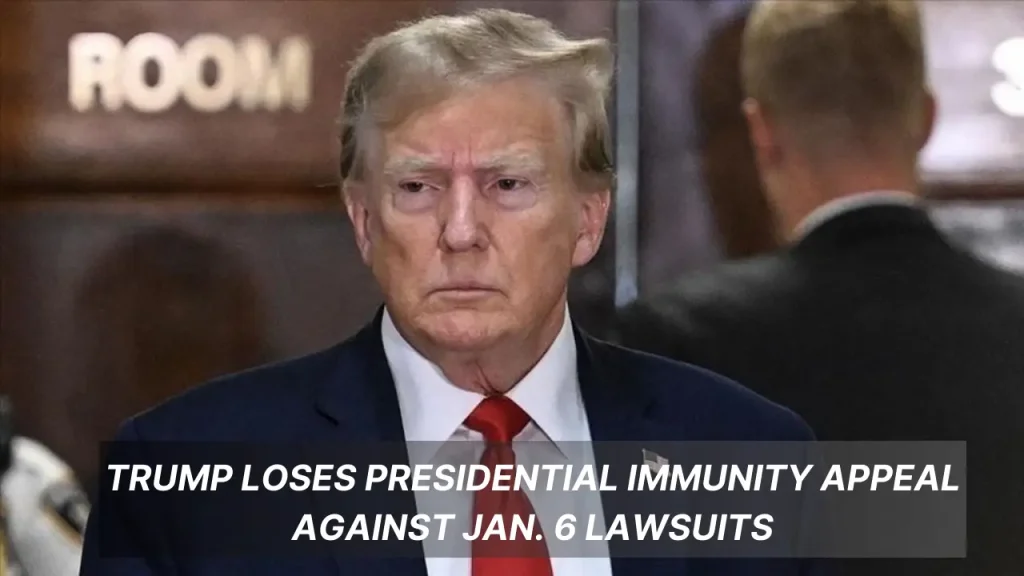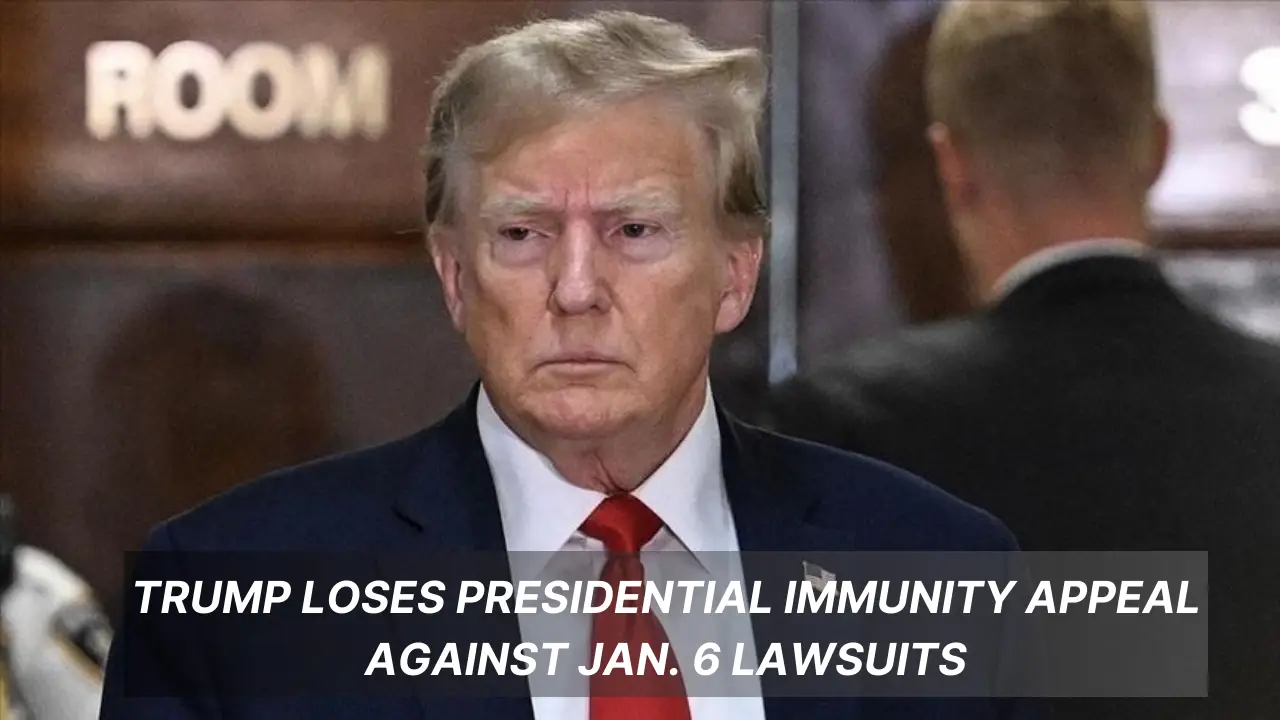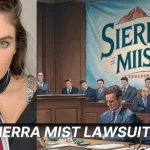Trump Loses Presidential Immunity Appeal Against Jan. 6 Lawsuits

Trump Loses Presidential Immunity Appeal Against Jan. 6 Lawsuits, Former President Donald Trump has opted not to appeal to the Supreme Court regarding his claim for presidential immunity from civil lawsuits related to the January 6 Capitol attack.
This decision marks a significant development in the ongoing legal battles stemming from the events of that day.
By choosing not to seek Supreme Court review, Trump has allowed these lawsuits, which accuse him of inciting the violence at the Capitol, to move forward in district court.
The significance of this decision cannot be understated, as it opens the door for the plaintiffs to pursue their claims in court, where Trump will have to defend his actions on January 6.
Impact on Legal Proceedings
Trump’s decision not to appeal means that the civil lawsuits brought by Capitol Police officers and members of Congress can now proceed in district court.
This move does not eliminate the possibility of Trump raising immunity defenses later in the legal process, but it does mean that the courts will now begin to examine the merits of the plaintiffs’ claims.
If Trump can successfully argue that his actions on January 6 were part of his official duties as president, he may still be able to have these lawsuits dismissed.
However, the current trajectory of the case suggests that Trump will face significant legal challenges as these lawsuits move forward.
| Fact/ Figure | Details |
| Date of Appeals Court Ruling | December 2023 |
| Supreme Court Petition Deadline | February 16, 2024 |
| Key Plaintiff | James Blassingame, Capitol Police officer injured during the January 6 attack |
| Plaintiffs’ Lawyer | Kristy Parker |
| Appeals Court Decision | Rejected Trump’s immunity claim, stating he acted as a political candidate, not in his official presidential role |
| Supreme Court Petition | Trump chose not to petition the Supreme Court, allowing civil lawsuits to proceed |
| Future Legal Proceedings | Trump can still argue immunity in district court and potentially seek dismissal |
| Number of Lawsuits | Multiple civil lawsuits, including those filed by Capitol Police officers and members of Congress |
| Public and Political Reactions | Mixed reactions, with some seeing it as a weakening of Trump’s legal defense and others as a strategic decision |
| Criminal Case Parallel | Trump is also asserting immunity in a separate criminal case related to January 6 |
Background of the Appeal
The lawsuits against Trump were filed by several Capitol Police officers and members of Congress who were present at the Capitol on January 6, 2021.
These plaintiffs are seeking to hold Trump personally accountable for the events of that day, claiming that his actions directly contributed to the violence that ensued.
Among the plaintiffs is James Blassingame, a Capitol Police officer who was injured during the riot.
The lawsuits argue that Trump’s speech and actions leading up to and on the day of the attack incited the mob that stormed the Capitol, putting the lives of lawmakers, police officers, and others at risk.
Participants
The key plaintiffs in these cases include Capitol Police officers like James Blassingame and several lawmakers who were in the Capitol during the attack. These individuals argue that Trump’s rhetoric and actions created a dangerous environment that directly led to the violence they experienced.
Blassingame, in particular, suffered physical injuries during the riot and is seeking compensation for the harm caused. The lawsuits are part of a broader effort to hold Trump accountable for his role in the January 6 events.
Immunity Claim
Trump has argued that his actions on January 6 were within the scope of his presidential duties, thereby granting him immunity from civil liability.
This claim of presidential immunity is based on the idea that a sitting president cannot be sued for actions taken in the course of official duties. However, the courts have been skeptical of this argument, particularly given the context of the January 6 attack.
The plaintiffs argue that Trump was not acting in his official capacity as president but rather as a political candidate seeking to overturn the results of the 2020 election.
Legal Arguments and Decisions
Appeals Court Ruling
In December, the U.S. Circuit Court of Appeals for the District of Columbia rejected Trump’s claim for broad presidential immunity.
The court found that Trump was acting as a political candidate, not in his official capacity as president, when he made the statements and took the actions that allegedly incited the January 6 attack.
This ruling was a significant blow to Trump’s legal defense, as it allowed the lawsuits to proceed to the next stage of litigation. The appeals court’s decision emphasized that Trump’s actions were not protected by the immunity usually afforded to sitting presidents.
Court’s Guidance
While rejecting Trump’s immunity claim, the appeals court did leave open the possibility for Trump to raise the issue again during district court proceedings.
The court noted that Trump should be given the opportunity to present evidence that his actions were, in fact, part of his official duties.
If he can successfully make this case, there is still a chance that the lawsuits could be dismissed on immunity grounds.
However, this will require a detailed examination of Trump’s actions and intentions on January 6, which could be a lengthy and complex legal process.
Supreme Court Decision
Trump had until February 16 to petition the Supreme Court for a review of the appeals court decision but chose not to do so.
This decision effectively allows the lawsuits to move forward in district court. The implications of this choice are significant, as it indicates that Trump’s legal team may be focusing on defending the case in the lower courts rather than seeking a broad ruling from the Supreme Court at this stage.
The decision not to appeal could be seen as a strategic move, allowing Trump to address the claims in a more detailed and controlled manner during district court proceedings.
Future Proceedings
Despite the decision not to appeal to the Supreme Court, Trump can still assert his immunity defense in the district court.
If he can demonstrate that his actions on January 6 were part of his official duties as president, he may still be able to have the lawsuits dismissed.
However, this will require a thorough examination of the facts and could lead to a protracted legal battle.
The outcome of these proceedings could have significant implications for Trump’s legal strategy in other cases related to January 6, as well as for future claims of presidential immunity.
Legal and Political Context
Criminal Case Parallel
The legal arguments being made in the civil lawsuits against Trump are similar to those in the criminal case arising from the January 6 attack. In the criminal case, Trump is also arguing that his actions on January 6 were protected by presidential immunity.
However, the courts have been skeptical of this argument in both the civil and criminal contexts. The distinction between Trump’s actions as a candidate and as a president is likely to be a key issue in both cases.
The overlap between the civil and criminal cases highlights the complex legal challenges Trump faces as he navigates multiple lawsuits stemming from January 6.
Supreme Court Appeal on Criminal Case
In addition to the civil lawsuits, Trump has also asked the Supreme Court to put his criminal case on hold on immunity grounds. This request is part of a broader legal strategy to delay or dismiss the various cases related to January 6.
The Supreme Court’s response to this request will be closely watched, as it could set a precedent for how presidential immunity is applied in cases involving former presidents.
The outcome of the criminal case could also influence the civil lawsuits, particularly if the courts rule on the scope of Trump’s immunity for actions taken while in office.
Reactions and Implications
Reactions from Plaintiffs
The plaintiffs in the civil lawsuits, including Capitol Police officers and lawmakers, have welcomed the opportunity to move forward with their cases.
Kristy Parker, a lawyer representing some of the plaintiffs, expressed optimism about proving their claims in court. The plaintiffs are seeking justice for the injuries and trauma they experienced on January 6 and are determined to hold Trump accountable for his role in the attack.
The decision not to appeal to the Supreme Court is seen as a victory for those seeking accountability and could set the stage for a significant legal showdown in district court.
Public and Political Reactions
The broader public and political reactions to Trump’s decision have been mixed. Some view it as an acknowledgment that Trump’s legal defenses are weakening, while others see it as a strategic move to fight the cases on more favorable terms.
The decision has also sparked renewed debate about the limits of presidential immunity and the accountability of former presidents for actions taken while in office.
The ongoing legal battles related to January 6 continue to be a major point of contention in American politics, with implications for the upcoming elections and the future of presidential power.
Key Facts and Figures
Deadlines and Dates
- December 2023: Appeals court rejects Trump’s immunity claim.
- February 16, 2024: Deadline for Trump to file a petition for Supreme Court review, which he chose not to do.
Case Participants
- James Blassingame: Capitol Police officer and lead plaintiff, injured during the January 6 attack.
- Kristy Parker: Lawyer representing plaintiffs, advocating for accountability and justice.
Conclusion
Trump’s decision not to appeal to the Supreme Court has significant implications for the ongoing legal battles related to January 6.
It allows the civil lawsuits to proceed, where Trump will have to defend his actions in district court.
This decision marks a critical juncture in the legal proceedings, as the courts will now begin to examine the merits of the plaintiffs’ claims and Trump’s defenses.
Future Outlook
As the lawsuits move forward, the courts will play a crucial role in determining the limits of presidential immunity and the accountability of former presidents.
The outcome of these cases could have far-reaching implications for Trump’s legal strategy and for the broader legal and political landscape.
The decision not to appeal to the Supreme Court suggests that Trump’s legal team is preparing for a detailed and potentially lengthy battle in district court, where the facts and legal arguments will be closely scrutinized.
FAQs
What was the main decision made by Donald Trump regarding the Jan. 6 lawsuits?
Trump chose not to appeal to the Supreme Court to contest an appeals court ruling that rejected his claim of presidential immunity from civil lawsuits related to the January 6 Capitol attack.
Who are the plaintiffs in the lawsuits against Trump?
The plaintiffs include Capitol Police officers, like James Blassingame, who were injured during the January 6 attack, as well as several members of Congress who were present at the Capitol that day.
What was the argument behind Trump’s immunity claim?
Trump’s legal team argued that his actions on January 6 fell under his official responsibilities as president, which they claimed should grant him immunity from civil liability.
What did the appeals court decide regarding Trump’s immunity claim?
The appeals court ruled that Trump was acting as a political candidate on January 6, rather than in his official capacity as president, and therefore could not claim immunity from the lawsuits. However, they noted that Trump could still argue for immunity in district court.
How does this decision impact the ongoing lawsuits?
Trump’s decision not to seek Supreme Court review allows the civil lawsuits to proceed in district court. However, he can still present his immunity argument during the trial.
Are there any criminal cases related to this issue?
Yes, Trump is also facing a separate criminal case related to January 6, in which he is making similar immunity arguments to delay or dismiss the proceedings.
What are the potential future outcomes of these lawsuits?
The lawsuits will move forward in district court, where Trump can continue to argue for immunity. Depending on the court’s findings, the cases could either be dismissed or proceed to trial, potentially impacting Trump’s legal and political standing.
What are the broader implications of this decision?
This decision could influence how future cases involving presidential actions are handled, especially regarding the limits of presidential immunity in civil and criminal matters. It also plays a significant role in the ongoing public and political discourse surrounding Trump’s actions on January 6.



No Comment! Be the first one.